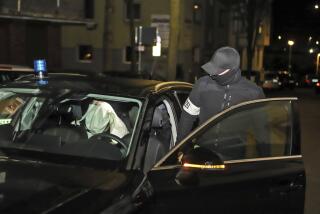Italy Arrests 6 Suspects in Terror Probe
PARIS — Italian police on Tuesday arrested a group of alleged Islamic terrorists that they linked to a fugitive Al Qaeda chief and to an organization in northeastern Iraq whose fighters were routed by U.S.-backed Kurdish troops in recent days.
Culminating a yearlong investigation that accelerated with the outbreak of the war in Iraq, police in three cities rounded up the six suspects Monday night and Tuesday morning. The cell sent recruits via Turkey and Syria to training camps run by Ansar al Islam in northeast Iraq, according to an Italian arrest order obtained by The Times.
Satellite phone calls and the clandestine movement of fighters between Italy and Iraq continued until the early days of the war, according to authorities. Police made the arrests because the suspects were preparing to escape from Italy to France, Germany and Syria after Kurdish and U.S troops invaded Ansar’s stronghold last weekend, authorities said.
The cell belonged to a Europe-wide network commanded by Abu Musab Zarqawi, a fugitive accused of being a top Al Qaeda figure, according to the arrest order, which was issued Monday by a judge in Milan.
When Secretary of State Colin L. Powell made his case against Iraq at the U.N. Security Council in February, he accused Saddam Hussein’s regime of protecting Zarqawi, a Jordanian, as he deployed operatives to Britain, France, Spain and Italy to carry out attacks with biological and chemical weapons. But European counterterrorism officials have expressed doubt that there are any ties between Zarqawi and Baghdad.
Italian police have not found evidence of direct links between their suspects and Hussein’s government, an Italian law enforcement official said. But wiretaps and other surveillance developed strong evidence connecting Ansar to Al Qaeda, the official said. The suspects also made what seemed to be references to plots to launch attacks in Europe, he said.
Zarqawi’s network turned to the camps in northeastern Iraq to compensate for the loss of Al Qaeda’s base in Afghanistan in late 2001, according to the judicial order. Ansar operated in territory nominally controlled by Kurdish forces, not by the Iraqi regime.
U.S. military officials have said Ansar al Islam operated a poison factory in Iraq that might have produced the deadly ricin found in London in January.
In Parma, Italy, two key members of Ansar aided Zarqawi, who, according to the judicial order, was working to redeploy militants who were scattered after the U.S. military moved into Afghanistan.
The two suspects arrested Monday night in Parma were Iraqi Kurds identified as Hamid Tahir Mohammed and Mostafa Amin Mohammed, both 27. Police in Milan arrested Egyptian Radi Ayashi, 30, and Somalian Cabullah Crise, 28, on Monday. On Tuesday, police in Cremona arrested Tunisians Mourad Trabelsi, the imam of a mosque there, and Hamraoui Ben Mouldi, 26.
The arrests were ordered by prosecutor Stefano Dambruoso in Milan, one of Italy’s anti-terror specialists. The case grew out of an investigation of an Al Qaeda network consisting mainly of Egyptians and Tunisians. Although prosecutions in 2001 and 2002 left most of the extremists behind bars, their trail led police to Osama Nasr, an Egyptian imam at the Via Quaranta mosque in Milan.
Police consider Nasr the top man in the cell that was dismantled Tuesday, but he disappeared in February. His family says he was abducted by Italian or foreign spies; authorities say he might have gone underground to avoid capture.
In July, police learned of contact between Nasr and an Islamic cell in Germany, authorities said. The investigation led to the Iraqi Kurds in Parma and then widened, according to the court document. Police determined that a new network had resumed Al Qaeda’s traditional function in Italy: recruiting and training aspiring holy warriors, in this case Iraqi Kurds, who make up one of Europe’s biggest immigrant groups.
Suspects in Milan and Parma allegedly sent recruits, mostly Iraqi Kurds and North Africans, to a spiritual leader in Syria who acted as a gatekeeper to the Ansar camps in Iraq, according to the court document.
“Iraqis trying to reach the zone of conflict [used] the logistical structure via Turkey and Syria managed by Mullah Fuad in direct and personal contact with [Ayashi in Milan] as emerges in very recent telephone conversations in March 2003,” the judicial order states.
Authorities did not further identify Mullah Fuad or comment on his status.
During the past week, leaders of the cell grew increasingly worried about the combat in Iraq and pressure by police in Europe, the Italian official said. The police closed in when they overheard urgent phone calls among suspects looking for fake documents and preparing to use the recruitment pipeline as an escape route to Syria, according to authorities.
More to Read
Sign up for Essential California
The most important California stories and recommendations in your inbox every morning.
You may occasionally receive promotional content from the Los Angeles Times.










